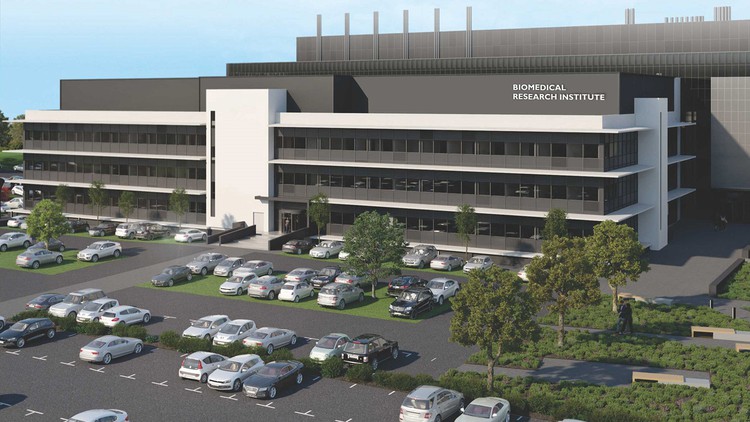Stellenbosch builds world class institute to investigate deadly diseases
R1 billion Biomedical Research Institute will be ready by 2022
Stellenbosch University has started building a new Biomedical Research Institute which will investigate diseases that have the greatest impact on South Africa and the rest of Africa.
This R1 billion-facility, which will be completed in 2022, will be one of the most innovative and advanced biomedical research centres in Africa. It will be based at the university’s Faculty of Medicine and Health Sciences in Tygerberg.
Faculty dean, Professor Jimmy Volmink said the institute would “advance our capacity to undertake world class research on the leading health problems affecting our people”. He also said it would build the region’s research capacity. Its main aim will be to investigate diseases, improve diagnoses and treat illness such as TB, HIV, diabetes, heart disease and neurological disorders.
Professor Nico Gey van Pittius, vice dean and molecular biologist, said bioinformatics is an interdisciplinary field which uses IT and statistics to understand biological data, for example the huge amount of genomic information generated by gene sequences. It includes the fields of population genetics as well as personalised medicine where patients are treated according to their genetic composition.
The faculty has been part of this type of research for the past 20 years and all these experts will be part of a new Bioinformatics Hub, where they will have access to the best high speed genetic processors.
Biomedical teaching, training and research has been based in the Physiology and Anatomy building, which was built in the 1970s. In the past four decades student numbers have more than tripled and the field of biomedicine has changed dramatically.
The new facility will increase research and teaching capacity in fields such as bioinformatics, genomics, anatomy, neurobiology, advanced surgical sciences, and biobanking.
Gey van Pittius said the Biobank will have storage capacity for medical tissue samples of more than 5 million people. This automated biobank, the first of its kind in Africa, will store samples at -80°C for the long term. It will contain a robot which can access an individual sample as requested. “A biobank storage facility is the key to research in medicine, especially in the era of genomics, proteomics, bioinformatics and personalised medicine.”
The new institute will also house a Proteomics laboratory. Proteomics is the analysis of the entire protein complement of a cell, tissue, or organism. Van Pittius explained that this can give good insight into the differences between how people are affected by disease.
There will also be conference facilities, a skills laboratory, a morphology museum, and electron microscopy laboratories. The latter has a very high resolution to see very small structures such as tuberculosis bacteria.
The building has to generate its own backup power supply said van Pittius. One fridge might contain enzymes worth millions of rands and a power outage would be disastrous. The samples in the Biobank will be irreplaceable and they need to be cooled down.
The institute will have some environmentally friendly features. The building will tie into the campus’s greywater masterplan, which allows for rain water harvesting and the use of borehole water. All toilets will be flushed with non-potable water. A smart lighting system will detect areas where natural light is strongest and adjust lighting accordingly, thereby drawing less electricity from the grid.
Support independent journalism
Donate using Payfast

Don't miss out on the latest news
We respect your privacy, and promise we won't spam you.
Next: Hundreds left homeless after shack fire in Dunoon
Previous: Changing the way our colleges work is key to reducing unemployment
© 2019 GroundUp.
This article is licensed under a Creative Commons Attribution-NoDerivatives 4.0 International License.
You may republish this article, so long as you credit the authors and GroundUp, and do not change the text. Please include a link back to the original article.

